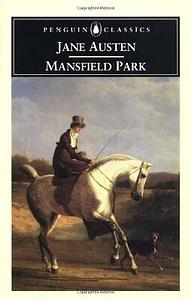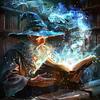Take a photo of a barcode or cover
emotional
hopeful
reflective
slow-paced
Plot or Character Driven:
Character
Strong character development:
Yes
Loveable characters:
Yes
Diverse cast of characters:
No
Flaws of characters a main focus:
Complicated
Well what to say.. The ending and last half were really good and interesting. The first half was so slow and confusing and not at all making this a top favorite of the Jane Austen books. Fanny and Edmund are so far some of my least favorite couples that Jane puts together. Maybe it is because she has it take so long and rushes it. I'm not sure. But I give it 3 stars because the ending made up for the beginning.
This was a good read. However my favorite is still tied between Pride and Prejudice and Emma.
For full review: https://katiegreviews.wordpress.com/2020/11/17/review-mansfield-park-by-jane-austen/
For full review: https://katiegreviews.wordpress.com/2020/11/17/review-mansfield-park-by-jane-austen/
This edition is published by the Folio Society. It is truly exquisite. It's not Northanger Abbey as the copyright page says it is. It's printed in the same typeface and formatting as the original edition would've been. The actual quality of the book itself is like a fine wine.
However, I didn't care much for the content of the book. I wouldn't be able to recount the plot or tell you who the characters are. Jane Austen uses a lot of run-on sentences and she tends to ramble quite a lot. I spent a lot of time waiting for her to just get to the point. However, I did learn a lot about how the English language used to be used; how certain words used to be spelt - grammar and formatting, that sort of thing. If nothing else, I can, at least, say that I've read it.
However, I didn't care much for the content of the book. I wouldn't be able to recount the plot or tell you who the characters are. Jane Austen uses a lot of run-on sentences and she tends to ramble quite a lot. I spent a lot of time waiting for her to just get to the point. However, I did learn a lot about how the English language used to be used; how certain words used to be spelt - grammar and formatting, that sort of thing. If nothing else, I can, at least, say that I've read it.
It's actually quite smart what Jane Austen does here by creating such extreme and caricaturesque characters to mock societal's expectations, behaviors, and such.
However, it might have been too extreme for me, as I found myself bored at times by the "white, rich problems" and entertained in the bits where the scandal and drama was going on.
However, it might have been too extreme for me, as I found myself bored at times by the "white, rich problems" and entertained in the bits where the scandal and drama was going on.
Listen, I enjoy Jane Austen. Really. Emma had me laughing and wishing I could visit Highbury. P&P is an obvious classic, and Sense and Sensibility had me hoping and dreaming for happy endings.
Maybe I just don't know enough about this world for the social commentary to land for me. But I just couldn't care about anything happening to any person in this book. One of the things I appreciate the most in Austen's work is how her characters come to know themselves and sometimes they change their minds, but sometimes they just have deep realizations about who they are within the world they live in. I never got that sense from anyone in this book except maybe Edmund. But I spent so much of the book being angry with him about falling all over Mary Crawford, that his finally coming around to Fanny in the end fell flat for me.
Maybe I just don't know enough about this world for the social commentary to land for me. But I just couldn't care about anything happening to any person in this book. One of the things I appreciate the most in Austen's work is how her characters come to know themselves and sometimes they change their minds, but sometimes they just have deep realizations about who they are within the world they live in. I never got that sense from anyone in this book except maybe Edmund. But I spent so much of the book being angry with him about falling all over Mary Crawford, that his finally coming around to Fanny in the end fell flat for me.
"Mansfield Park" ist, wie alle anderen Romane von Jane Austen, ein echtes Highlight. Hier erwartet uns diesmal die Lebensgeschichte von Fanny, die bei ihrer Tante einzieht, um die eigene Familie zu entlasten.
Mit viel Satire, Humor und einigen Dramen wird das alltägliche Leben von den Bewohnern in Mansfield Park lebhaft beschrieben. Zeitweise ist es etwas sehr langatmig, aber trotzdem ein schöner Klassiker.
Mit viel Satire, Humor und einigen Dramen wird das alltägliche Leben von den Bewohnern in Mansfield Park lebhaft beschrieben. Zeitweise ist es etwas sehr langatmig, aber trotzdem ein schöner Klassiker.
emotional
slow-paced
Plot or Character Driven:
A mix
Strong character development:
Yes
Loveable characters:
Yes
Diverse cast of characters:
No
Flaws of characters a main focus:
Yes
This was only known to me as a movie to me for years, and then I happened across a copy of the book at work. I'd heard a lot from friends about the less than lovable heroine and hero of this novel, so I delved into it expecting only the mild verbal satisfaction delivered by Jane Austen through biting insight.
I was pleasantly surprised. Her main character, Fanny, might read as histrionic as various points in the book, but the core of the character--her willful self-denial, her presumed social ineptitude, her loyalty--fascinates me. She is more akin to a Dickens woman in her trials than anything else, so of course she can't be Elizabeth Bennett. Her story is one of longevity, and that in itself is full of interesting diversions concerning the theatre, life at a bustling country estate and the proper way of thinking about others' professional choices.
This book was so light and breezy that I was engulfed by its more impassioned speeches, particularly those delivered by Fanny's love interests, Henry Crawford and Edmund. Edmund could be fairly strident, but as Austen frames this correct man, she gives him large blinders when it comes to love and an assured twinkle in his eye when it comes to matters of his father's dictatorial household. That he doesn't see Fanny's inner strength is his fault, though he loves her best in the world, and it is also why the novel flows forward with some of Austen's best pacing.
Crawford's sister Mary is also one of Austen's most compelling and bitchiest characters. Her choices are motivated totally by thoughts of advantage, making her one Jane's shrewdest and most calculating prima donnas. However, her love for Edmund, though misplaced, is not disingenuous, adding more and more layers throughout. And since this is a novel about the performances we give in society to hide what lies underneath, it is grand that Mary is included in the game not just as a player of others' emotions but a pawn of her own.
I was pleasantly surprised. Her main character, Fanny, might read as histrionic as various points in the book, but the core of the character--her willful self-denial, her presumed social ineptitude, her loyalty--fascinates me. She is more akin to a Dickens woman in her trials than anything else, so of course she can't be Elizabeth Bennett. Her story is one of longevity, and that in itself is full of interesting diversions concerning the theatre, life at a bustling country estate and the proper way of thinking about others' professional choices.
This book was so light and breezy that I was engulfed by its more impassioned speeches, particularly those delivered by Fanny's love interests, Henry Crawford and Edmund. Edmund could be fairly strident, but as Austen frames this correct man, she gives him large blinders when it comes to love and an assured twinkle in his eye when it comes to matters of his father's dictatorial household. That he doesn't see Fanny's inner strength is his fault, though he loves her best in the world, and it is also why the novel flows forward with some of Austen's best pacing.
Crawford's sister Mary is also one of Austen's most compelling and bitchiest characters. Her choices are motivated totally by thoughts of advantage, making her one Jane's shrewdest and most calculating prima donnas. However, her love for Edmund, though misplaced, is not disingenuous, adding more and more layers throughout. And since this is a novel about the performances we give in society to hide what lies underneath, it is grand that Mary is included in the game not just as a player of others' emotions but a pawn of her own.






